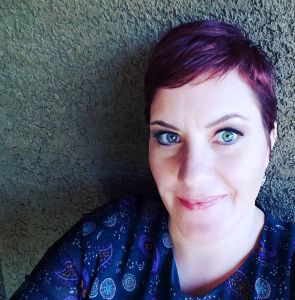If you haven't done so already, check out Court's award-winning essay "How to Breathe" and then return here for a chat with the author.
WOW: Congratulations on placing second in the Q1 2025 Creative Nonfiction Contest! How did you begin writing your essay and how did it and your writing processes evolve as you wrote?
Court: I'd been thinking about breath for a long time, and why breathing, and general matters of breath, had sometimes seemed problematic for me. So, my subconscious had been working on that idea in the background, probably for years, but the true catalyst, the actual beginning of the essay, was that text exchange. So, I made the launch the launch. And from there, I think I wrote the rest of the piece in one sitting. Granted, I had also been thinking about segmentation and fragmentation, and I had wanted to try a new (to me) structure for a flash essay. The sections seemed to flow organically from my mind right through my typing fingers. After the initial headrush of drafting, the piece underwent some tightening, but honestly, very little radical revision.
WOW: That’s a nice combination of factors you used to pull your piece together. What did you learn about yourself or your writing by creating this essay?
Court: The essay helped me identify and analyze my history of trauma surrounding breath. I realized that my trauma was older than I thought—that it likely began with my own birth, then was compounded by my son's birth and death. I desperately wanted to understand why breathing had never seemed "natural" to me as a bodily function, and why I felt so fiercely protective of my own breath, even when I should be letting go, trusting and relaxing. I mean, yes, we all need to breathe to live, but my issues seemed to extend beyond mere self-preservation. And it was a great relief to finally recognize those primordial fears, and to wrangle with them in a productive way.
WOW: Wow, that is a powerful realization. Thank you for sharing that, and your essay, with us. I love hearing about the healing properties of writing. You have an impressive writing resume. Of your many literary accomplishments, which one most stands out to you and why?
Court: Haha, you're asking me to choose between my children, which is impossible to do. I know that some literary critics feel like the mother-writer metaphor is overdone at best, fundamentally flawed at worst, but I do feel a particular type of maternal fondness for my work. I grow frustrated with it, too, just as I've done with my biological children. Maternal love can be sometimes fickle, as well, a terrible lesson I learned from my own mother. Or maybe it's more generous to say that sometimes mothers are...tired. When I read over my published work—which I do from time to time to remind myself of where my words reside in the world—I sometimes fall in love again with the text, and other times I grow frustrated with its obvious limitations. But I've learned that those natural feelings of inadequacy are my own and shouldn't be attributed to the "children" themselves.
WOW: Which creative nonfiction essays or writers have inspired you most, and in what ways did they inspire you?
Court: I know I am not alone in this praise, but I so admire Aimee Nezhukumatathil's deep connection with the natural world. The way that she situates herself within the world, with such deep respect for nature's creatures and landscapes. She writes a beautiful, tender blend of personal memoir and ecological literature. She's a wonderful writing instructor as well. I took an online workshop with her a few years ago on the nocturne and left the class feeling truly inspired. I hope to catch her on tour for her new book this spring, when she visits Northern Kentucky University, my undergrad alma mater.
WOW: How wonderful to have been taught by someone whose work you admire so deeply. If you could tell your younger self anything about writing, what would it be?
Court: Though I knew I was a writer early in life, I spent many years denying myself that identity. I let others degrade my interest in the art for the sake of financial security. Security is necessary, of course, but you can live securely as a writer—there are ways. I'm lucky that my day gig as an editor keeps the lights on while I continue to explore my craft, and I'm especially lucky that my day gig connects me with talented writers passionate about their work. I learn so much from editing the work of others, but I do sometimes lose focus on my own writing goals. So, I think I would tell my younger self to follow the light within, the one leading me to words and their wisdoms.
WOW: I love that advice, and I imagine that rings true for many other writers, too. Thank you for sharing your writing with us and for your thoughtful responses. Happy writing!
Interviewed by Anne Greenawalt, founder and editor-in-chief of Sport Stories Press, which publishes sports books by, for, and about sportswomen and amateur athletes. Engage on Twitter or Instagram @GreenMachine459.







0 comments:
Post a Comment